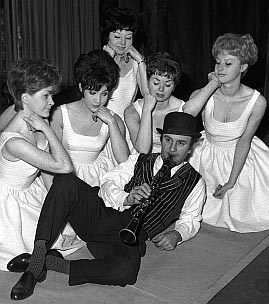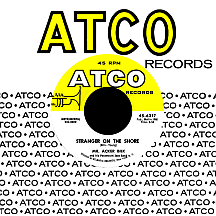MR. ACKER BILK
Stranger on the Shore
Stranger on the Shore premiered on England's BBC-TV in September 1961. A weekly serial that aired for just five weeks, it starred 19-year-old Welsh actress Jeanne Le Bars, who reprised her role (as did most of the cast) in the spring '62 sequel Stranger in the City. Both limited series received positive reviews but have since been seen by few, though the show hasn't exactly been filed away and forgotten; thanks go to its theme song for that, an instrumental with a silky-smooth clarinet solo by the sublimely-bearded, bowler-cap-sporting Mr. Acker Bilk. The song, originally titled "Jenny" after Bilk's baby daughter, was written in collaboration with arranger Leon Young but retitled "Stranger on the Shore" when the show's producers showed interest in using it for the atmospheric family-oriented drama show set by the sea.
Bilk was taken quite by surprise when the record, after debuting on the British charts at the end of November '61, hit number one the following January and then remained on the charts throughout the entirety of 1962, five months of which it spent in the top ten resulting in sales of over a million copies, a very difficult accomplishment in a nation with less than one-third the population of the United States. Even more surprising was its acceptance across the Atlantic where, completely disconnected from the U.K.-only teleplay, it perched at the chart's pinnacle in May. Everyone simply loved the song!
Born and raised in Pensford, Somerset in the southern part of England, Bernard Stanley Bilk was in his late teens before he began playing the clarinet; he served in Britain's Armed Forces with the Royal Engineers, where the nickname "Acker" (slang for "mate") took hold. After his discharge in 1950 he married and accepted a job in a tobacco plant in Bristol, just north of his home town, then abandoned such a restrictive routine and headed for London to join trumpeter Ken Colyer's band, which specialized in early-century New Orleans jazz. Leaving Colyer around 1955, he opened a jazz club in Bristol, the Paramount, and formed his Paramount Jazz Band. Record-making got under way in 1956 on Tempo and, later, major label Pye. A handful of traditional jazz recordings also appeared on the Esquire and Melodisc labels around 1959 before he joined Columbia and racked up his first hit. His expertise with the "licorice stick" became obvious to a large audience with "Summer Set" (sounds like Somerset, get it?), written by Bilk and David Collett, a top ten U.K. hit in early 1960; it was licensed to Atco records in the U.S., but California-born trumpeter Monty Kelly gained the winning edge, taking his version to the top 30.

Acker had an image back home that was hard to miss, what with the goatee, bowler hats and stylish striped waistcoats (in the states we'd probably call them vests). Catching the "trad jazz" wave in Britain at just the right time, he enjoyed additional hit singles in his homeland ("Buona Sera," "That's My Home" and "Creole Jazz" in 1961) and solid-selling albums including two Best of Barber and Bilk LPs with his friend and trombone-blowin' buddy Chris Barber as well as the triple-threat Best of Ball, Barber and Bilk that included trumpeting funster Kenny Ball (who'd hit big in '62 with "Midnight in Moscow" just before Bilk's blockbuster). These three along with The Temperance Seven, Terry Lightfoot and others, gave weight to the notion that there existed a high-profile jazz alternative to rock and roll...in the British Isles, at least.
"Stranger on the Shore," just the third U.S. chart-topper by a British act ("Auf Wiederseh'n Sweetheart" by Vera Lynn and "He's Got the Whole World in His Hands" by barely-teen Laurie London had been there before), was the year's biggest instrumental, credited to Acker Bilk and his Paramount Jazz Band on Atco labels, even though he was actually backed by The Leon Young String Chorale (as shown on the original U.K. Columbia label). The Stranger on the Shore album on Atco had a lengthy stretch in the top ten and a U.S. tour won him new fans young and old; a two-part take on "Dardanella" (a tune minted some four decades earlier) popped up on Reprise while demand for the "Shore" smash kept rackjobbers busy. Follow-up Bilk singles on Atco like Bob Merrill's "Above the Stars" and Charles Chaplin's "Limelight" upped the string ratio and filled out the year in the U.S. while Bilk and Norrie Paramor's "Lonely" rode high back in Acker's Albion stomping grounds.
A softly celestial reworking of The Platters' signature tune "Only You (And You Alone)" reached the charts in America, right around the time NARAS noticed the bearded Bilk's work and granted a pair of Grammy nominations (but not wins!) to "Stranger on the Shore" in the excessively-named category Best Performance by an Orchestra or Instrumentalist with Orchestra, Not Jazz or Dancing (The Colorful Peter Nero emerged victorious) as well as the composer's category Best Instrumental Theme (the song lost to Bobby Scott and Ric Marlow's "A Taste of Honey," while a version Bilk recorded had been a U.K. hit shortly before the awards event was held).
Staying close to his trad roots while contemporizing the sound just a bit, he returned to the top ten in England in 1976 with the slightly "new age"-influenced "Aria." Mr. Acker Bilk and his Paramount Jazz Band, a few of its members sticking around for the long haul, kept performing well into the new millennium.


